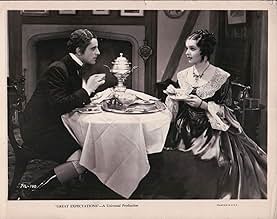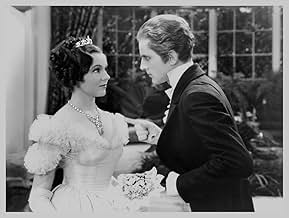Ajouter une intrigue dans votre langue9 year old 'Pip' Pirrip, an orphan living with relatives, aids and befriends an escaped convict on the moors, an act that will have a profound effect on his life.9 year old 'Pip' Pirrip, an orphan living with relatives, aids and befriends an escaped convict on the moors, an act that will have a profound effect on his life.9 year old 'Pip' Pirrip, an orphan living with relatives, aids and befriends an escaped convict on the moors, an act that will have a profound effect on his life.
- Réalisation
- Scénario
- Casting principal
- Récompenses
- 2 victoires au total
Francis L. Sullivan
- Jaggers
- (as Francis Sullivan)
George P. Breakston
- Pip, as Child
- (as Georgie Breakston)
Eily Malyon
- Sarah Pocket
- (as Eily Malyan)
Valerie Hobson
- Biddy
- (scènes coupées)
Avis à la une
This first sound adaptation of Dickens' 'Great Expectations' is sorely lacking anything connected with Charles Dickens. Phillips Holmes is a fine actor and he puts all that he can into the hackneyed script. Miss Havisham is played in a sentimental manner and she actually shows kindness. Jane Wyatt is also sympathetic! Her coldness, which she talks about with Miss Havisham, is lacking in action. This would all be fine if it were an original story but it is purportedly 'Great Expectations'! Stick with David Lean's far superior film and the BBC mini-series actually made in Britain. It is no wonder that Phillips Holmes left to make most of his final films in the UK after being disgusted with this film.
This 1934 version of "Great Expectations", directed by Stuart Walker, has been largely ignored because it pales in comparison with the masterpiece that David Lean made from the same story in the 40's. By comparison, this earlier version is plain and undistinguished, but it is not a bad film in its own right. It is a faithful rendering of the Dickens novel, which is a fascinating story that in itself makes any reasonable movie version worth watching.
The main thing that limits the effectiveness of this version is that most of the acting is so routine. Dickens' characters are always very distinctive (if not peculiar), and to be most effective in a movie they must be slightly exaggerated. Characters like Pip, Magwitch, Miss Havisham, and Estella all have quirks and/or inner conflicts that are very important in making the story work. That is what made David Lean's two adaptations of Dickens stories such brilliant films - he was able to get his actors to portray the characters in exactly the way Dickens created them. But here, only Henry Hull as Magwitch fully realizes the potential of his character.
Still, the story itself is told well enough. The novel was one of Dickens' best, a brilliant study of the main characters: Pip, whose entire life depends on a stroke of good fortune that he misunderstands; Miss Havisham, who spends her whole life reliving one awful experience from her youth; Estella, torn between Pip's warm innocence and Miss Havisham's cold psychological cruelty; Magwitch, desperately trying to leave behind something positive after a sordid, dishonorable life. Although this film version does not realize the full potential of all of these characters, it does at least make sure that we can see who they are, and can ponder the possibilities for ourselves.
The great Lean version of "Great Expectations" is now very hard to find, and for those who like Dickens' stories, this version, while by no means a worthy replacement, is at least a watchable substitute.
The main thing that limits the effectiveness of this version is that most of the acting is so routine. Dickens' characters are always very distinctive (if not peculiar), and to be most effective in a movie they must be slightly exaggerated. Characters like Pip, Magwitch, Miss Havisham, and Estella all have quirks and/or inner conflicts that are very important in making the story work. That is what made David Lean's two adaptations of Dickens stories such brilliant films - he was able to get his actors to portray the characters in exactly the way Dickens created them. But here, only Henry Hull as Magwitch fully realizes the potential of his character.
Still, the story itself is told well enough. The novel was one of Dickens' best, a brilliant study of the main characters: Pip, whose entire life depends on a stroke of good fortune that he misunderstands; Miss Havisham, who spends her whole life reliving one awful experience from her youth; Estella, torn between Pip's warm innocence and Miss Havisham's cold psychological cruelty; Magwitch, desperately trying to leave behind something positive after a sordid, dishonorable life. Although this film version does not realize the full potential of all of these characters, it does at least make sure that we can see who they are, and can ponder the possibilities for ourselves.
The great Lean version of "Great Expectations" is now very hard to find, and for those who like Dickens' stories, this version, while by no means a worthy replacement, is at least a watchable substitute.
This is perhaps the worst film version of a Dickens novel ever made by a major studio. All of the dramatic power of the story is drowned in syrupy music and mostly mediocre to awful acting. Phillips Holmes is terrible as the adult Pip. Holmes, never a good actor, is alternately stiff and hammy.
Henry Hull, usually quite enjoyable when hammy, and actually quite good normally, is unsatisfying compared to Finlay Currie as Magwitch (Currie appeared in the classic 1946 David Lean film). Jane Wyatt conveys nothing of the icy-yet sympathetic haughtiness of Estella. Florence Reed is just fair as Miss Havisham, especially when compared with Martita Hunt's absolutely unforgettable 1947 performance, and Francis L.Sullivan showed much more enthusiasm playing Jaggers in the 1946 film.
Henry Hull, usually quite enjoyable when hammy, and actually quite good normally, is unsatisfying compared to Finlay Currie as Magwitch (Currie appeared in the classic 1946 David Lean film). Jane Wyatt conveys nothing of the icy-yet sympathetic haughtiness of Estella. Florence Reed is just fair as Miss Havisham, especially when compared with Martita Hunt's absolutely unforgettable 1947 performance, and Francis L.Sullivan showed much more enthusiasm playing Jaggers in the 1946 film.
It is hard to compare this version or any other version of Great Epacation because of the numerous ones made ,and the fact that they were all made in different time periods. The main idea though is to get the point of the novel across. This version does this in a very timely manner as well as appealing. While it may not be a blockbuster it is a fair interpretation of the movie. It should not be taken lightly. It is in fact a great movie for the use in teaching of the book. Were is in the place I view this fine production. Even though it is not the best I want to reinforce again it should not be forgotten ,and should be remembered as a classic.
There have been too many adaptations of Great Expectations and other Dickens classics that have failed to miss the fact that the eminent Victorian author's novels were not intended as sentimental, romantic fairytales but as scathing criticisms of the less-than-progressive aspects of life in 19th century Britain,namely the exploitation of the impoverished masses by the hypocritical idle rich. This 1934 travesty is about as accurate a realization of Dickens' original vision as Free Willy is a realization of Melville's vision for Moby-Dick. The scenes involving young Pip are played out like an Our Gang comedy complete with cloying music and the rest of it is filled with wooden acting,overly high key lighting, and an abundance of peculiarly well-fed poor people- this last aspect a phenomenon that plagued other mis-begotten Dickens farces of the '30s such as Monogram's Oliver Twist and the MGM A Christmas Carol. Every time this shows up on cable(a rarity at least in Madison,thank God) or is borrowed from a library,Dickens must do a backflip in his grave. All said, if you want to see DICKENS' Great Expectations stick with the Lean version or the respectable 1989 Disney version.Leave this one to rot in Miss Havisham's wedding cake.
Le saviez-vous
- AnecdotesFrancis L. Sullivan recreated the role of Jaggers in the 1946 adaptation of the novel.
- Citations
Prisoner on Ship: What are you sniveling about?
Second prisoner: My poor mother came to see me off.
Prisoner on Ship: [Amused] Mine was too drunk to come.
- Crédits fousIn the end credits, Valerie Hobson, who played Estella as an adult in David Lean's 1946 version of "Great Expectations", is credited as having played Biddy, a rather prominent character, in this 1934 version, but Biddy never appears at all.
- ConnexionsReferenced in Svengoolie: Werewolf of London (2011)
Meilleurs choix
Connectez-vous pour évaluer et suivre la liste de favoris afin de recevoir des recommandations personnalisées
- How long is Great Expectations?Alimenté par Alexa
Détails
- Date de sortie
- Pays d’origine
- Site officiel
- Langue
- Aussi connu sous le nom de
- Fången från djävulsskeppet
- Lieux de tournage
- Société de production
- Voir plus de crédits d'entreprise sur IMDbPro
- Durée1 heure 42 minutes
- Couleur
- Rapport de forme
- 1.37 : 1
Contribuer à cette page
Suggérer une modification ou ajouter du contenu manquant

Lacune principale
By what name was Great Expectations (1934) officially released in Canada in English?
Répondre




































